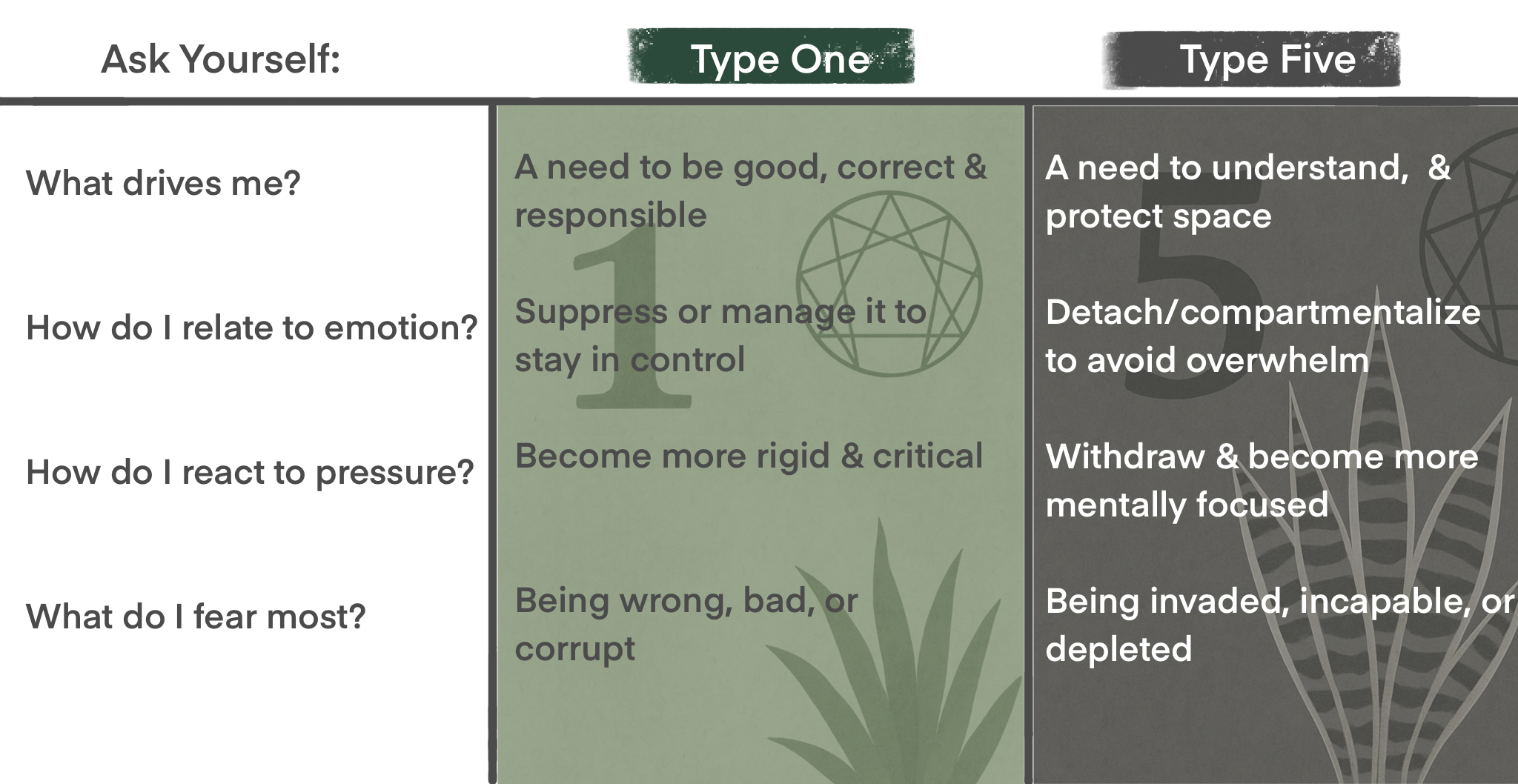In-Depth Comparison
At first glance, Ones and Fives might seem similar. They both tend to be private, intellectual, and restrained in how they express themselves. Both can come off as detached or intense, especially when they’re in their heads, so it’s not unusual for someone trying to type themselves to wonder if they’re one or the other.
But their reasons for that detachment couldn’t be more different.
Type One pulls back because they’re trying to stay in control. There’s a deep internal critic at play, and they’re constantly measuring themselves (and others) against a standard of rightness. Even in quiet moments, their minds are evaluating: “Am I doing the right thing?” “Did I say that the right way?” They’re emotionally suppressed but not emotionally absent; there’s tension under the surface.
Type Five, by contrast, pulls back to protect their energy and autonomy. Fives withdraw so they can observe, analyze, and make sense of the world on their own terms. They tend to compartmentalize their emotions, not because they feel guilty for having them (like Ones), but because feelings can feel overwhelming, chaotic, or intrusive. They’re more emotionally distant than self-critical.
Ones are more externally focused, acting from gut instinct and a desire to improve.
Fives are more internally focused, acting from a place of research, conservation, and analysis.
Ones are more likely to intrude or correct when something feels wrong; Fives are more likely to withdraw or observe.
The One wants to fix the mess.
The Five wants to understand it before they even consider acting.
If you’re deciding between the two, ask yourself:
Do I need to feel competent before I act (Five), or do I need to feel morally certain (One)?
Do I stay quiet because I’m conserving energy (Five), or because I’m trying not to say the wrong thing (One)?
Quick Spot-the-Difference Table
Special Considerations & Deeper Theory
Different Intelligence Centers
Ones are in the Gut Center, grounded in instinct, tension, and a drive to act rightly.
Fives are in the Head Center, relying on analysis, observation, and detachment to feel secure.
Even if both appear thoughtful and reserved, the source of their behavior differs.
A One holds back to maintain control and moral integrity.
A Five withdraws to conserve energy and avoid being overwhelmed or intruded upon.
Shared Traits: Independence, Restraint, and Control
Both types can seem principled, minimalist, or even ascetic at times, but for different reasons.
Ones want to live ethically, with self-discipline and moral purpose.
Fives want to remain autonomous, free from excessive demands and emotional intrusion.
This overlap can confuse people who pride themselves on restraint, logic, and internal standards. A minimalist, organized Five might mistake their behavior for perfectionism. A scholarly One might identify more with their thought process than their gut instinct.
Wings Can Blur the Line
A 1w9 tends to be more detached, cerebral, and internalized, sometimes mistaken for a Five due to their quiet, principled nature.
A 5w6 can appear dutiful, principled, and aligned with causes or systems, mistaking their loyalty to knowledge or justice for a One’s sense of moral responsibility.
Relational Stance: Different Approaches to Engagement
Ones are in the Dependent Stance, meaning they externally reference expectations, rules, or moral authority, even if they resist it.
Fives are in the Withdrawn Stance, meaning they disengage to make sense of the world from a safe distance.
This distinction matters. A Five might seem outwardly obedient or principled, but it’s coming from an internalized framework, not a need to meet external standards.
Stress & Growth Confusion
Ones move to Seven in growth, becoming more spontaneous, open-minded, and playful, traits that can mimic a healthy, curious Five.
Fives move to Seven in stress, becoming scattered, impulsive, or overstimulated. This can look like a disorganized or burned-out One who’s given up on structure.
Because they share the same arrow, both types can resemble each other in motion, either toward liberation or chaos.
Common Mistyping Pitfalls
You might think you're a Five if you're a One who values learning, solitude, and internal control, and feels drained by constant expectations.
You might think you're a One if you're a Five who uses systems of right/wrong to stabilize your world, especially in professions where accuracy, ethics, or order are paramount.
Reflect & Explore
When you’re overwhelmed, do you retreat to recharge your energy (Five), or push harder to meet expectations (One)?
Does your internal voice sound more like “I should be better” (One) or “I need space to think” (Five)?
Are you more focused on doing the right thing (One) or understanding things fully before acting (Five)?

